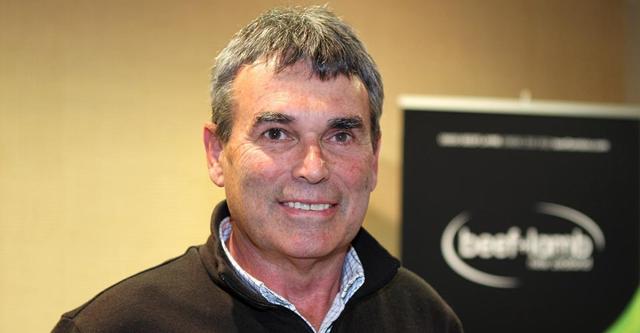“It’s been a blast”.

This is how Mark Harris describes his 20-year tenure as Beef + Lamb New Zealand’s Extension Manager, servicing farmers in the Hawkes Bay and Gisborne regions.
The 69-year-old ticked off his 20-year anniversary in August, just four months ahead of leaving B+LNZ for good as he and his wife Fiona move on to the next phase of their lives.
Looking back, Mark recalls fondly the many people he has met in his role and the many opportunities it has offered, not the least of which was a trip to Nepal to learn first-hand how to deal with an outbreak of Foot and Mouth Disease.
Mark was born and brought up on his family’s multi-generational Gisborne hill country sheep and beef farm. He was a managing partner on this farm until it was sold in the early 2000s when Mark, Fiona and their children moved to Hawkes Bay.
Mark spent time driving trucks and working in various roles in the primary sector, including setting up an event management consultancy.
It was the loss of sight in his eye due to a detached retina that changed his career trajectory, and he heard about the Extension Manager’s role with Meat and Wool New Zealand though his late brother Kim.
In those days, the role was split 50:50 between the Economic Service and Extension, so between late January and September the focus was on delivering the majority of the extension work through Monitor Farms and workshops. But throughout the year, Mark also collected data from the 40-45 farms involved in the Economic Service’s long-running farm survey.
Mark says it was always a scramble getting the survey data in before close off date on 30 June, none more so than when his computer crashed, taking all his data with it, just days before Mark was due to travel to the UK to coach rugby on unpaid leave.
Mark worked in the Eastern North Island alongside Richmond Beetham, who was based in Wairarapa, and Doug Syme. Between them, they took care of both extension activities and the Economic Service work from East Cape to Cape Palliser.
In 2009, Meat and Wool New Zealand became Beef + Lamb New Zealand with farmers voting against a wool levy.
This meant an approximately 25 percent reduction in levies and a loss of staff. It was a difficult time for the organisation and Mark says some good people lost their jobs as a result.
Through this process, Mark had to decide whether he wanted to work solely in the Economic Service or in Extension.
“It was a hard call. I really enjoy working with numbers. I’m slightly dyslexic so working on the profitability of a farm using data really spun my wheels.”
But for the extroverted Mark, the opportunity to work alongside people and manage events won out.
In those days, much of the extension activity was based around B+LNZ’s Monitor Farms, usually one in Gisborne and one in Hawkes Bay. Through this programme, Mark was still able to work closely with the Economic Service which crunched the numbers for the participating farms.
Running extension activities in both Gisborne and Hawkes Bay meant there aren’t too many bends on that notoriously difficult road that Mark has not become familiar with.
On average, Mark is in Gisborne twice a month, usually staying at least a couple of days on each visit.
“Growing up Gisborne I’ve always known that road. It’s just the norm.”
As a local, Mark brought with him a strong network of farming and industry people when he joined B+LNZ and that network has continued to grow.
Having had a long association with the Waipaoa Cadet programme, Mark has seen the career progression of many of these young people and jokes that it’s time to leave before he starts seeing their children coming through the industry.
He lists being awarded Hawkes Bay Primary Sector Professional of the Year 2019, the Waipaoa Cadet Programme support and his 18-year involvement in the Ahuwhenua Trophy, which celebrates excellence in Māori farming, as being career highlights.
“Again, it’s the people involved in Māori Corporations who want to do great things for their whenua and whanau and to get the governance right.”
For Mark personally, the Ahuwhenua Awards has given him the opportunity to learn more about his own Māori roots.
Over his time with B+LNZ, Mark has supported farmers through adversity including droughts, a pandemic, cyclones and the Kaikoura earthquake where he led B+LNZ’s on-the-ground response.
With all these natural disasters, there are a lot of similarities in the way the response is managed, and Mark does find it frustrating that there is a tendency to try and “re-write the book” every time rather than just use an updated version.
“We sometimes forget how adaptable farmers are under a challenge. They can generally solve their own problems; they just need the resources and some support.”
Faced with drought, Mark has found a number farmers often lack the confidence to make timely decisions and he works to the adage that the bad decision made too early is always better than a good decision made too late.
He says it is about giving farmers the support and confidence to make early decisions before their hands are forced due to lack of feed.
Mark says demand for B+LNZ’s services is always high during the tough times, the challenge for the organisation is to get through the door in both good times and bad.
As Mark leaves his role, sheep and beef farming is in good heart after a particularly tough couple of years.
But Mark has stood alongside his farmers in good times and bad and has enjoyed every minute of the rollercoast ride that is sheep and beef farming. For him it is all about the people, He tangata, he tangata, he tangata.